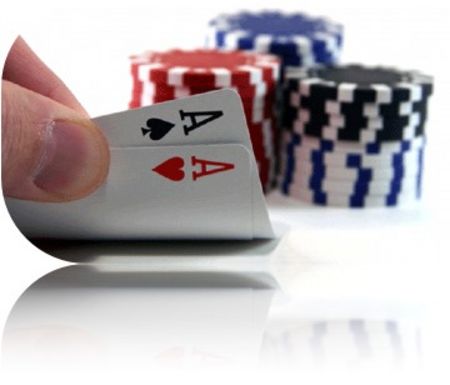Trips

Trips is a strong hand, but it is often difficult to conceal the strength of your hand
making it difficult to win a large pot. For this reason, you should tend to play these
hands stronger on the flop than you would sets since it is more difficult for your
opponents to improve to a good second-best hand and your opponents will often
back off on the turn.
You need to be worried about possible draws when the flop is two-suited or the
third card is connected to the pair, especially if it is a high pair. Strategies in this
case are similar to a two-suited or two-connected flop when you hold a set. You
should almost always either bet out or raise, unless you decide to slowplay against
a lone opponent when the pot is small.
Let's look at flops that are not too threatening. For example, you hold J ♥ T ♥ and the
flop is T ♣ T ♦ 5 ♠. As usual, if the pot is large, you should play your hand strongly.
Check-raising with these types of flops is risky since many opponents are reluctant
to bet with a high pair on the board; therefore, almost always bet out or raise when
the pot is large.
Slowplaying is an option when the pot is small. You can sometimes just call an
opponent's bet to wait and raise the turn, especially if you feet your opponent
doesn't have a very strong hand. However, it is more difficult to get a lot of action
with trips than sets, so sometimes it is better to just go ahead and raise to gain that
extra bet on the flop. The problem with just calling is that your opponent will be
worried that you have trips and will often just check the turn once you have called
the flop. This is an even bigger problem if your opponent acts behind you on the
turn and takes a free card.
If an opponent bets and there are several players left to act behind you. tend to
raise if they are strong opponents and just call if they are weak opponents. Strong
opponents generally are reluctant to be a third caller on this type of flop, so
generally it is better to go ahead and raise your lone opponent. However, if there
are weak opponents left to act, consider slowplaying since they tend to call with
many hands even with a scary board.
If you raised preflop and must act first, generally bet out your trips. Your trips are
somewhat concealed since your opponents expect you to bet out most of the time
anyway after raising preflop.
If you didn't raise preflop and must act first, checking is usually the best option
when there is a good chance that your opponents will fold if you bet. If you do
decide to check and an opponent bets, I would almost always check-raise since
your opponents will usually back off on the turn as discussed above. Check-raising
the flop can also add a deceptive quality to your play since some opponents expect
you to slowplay such a strong hand to the turn.
One caution about playing trips when your kicker is not very good. If you start to
receive a lot of action, you might need to back off. Since these types of flops are
scary for your opponents, they will usually not play too aggressively unless they
hold trips or maybe even a full house. You will still play to the river, but you may
need to put on the brakes with your raises if the action is really strong.
NEXT...Review

